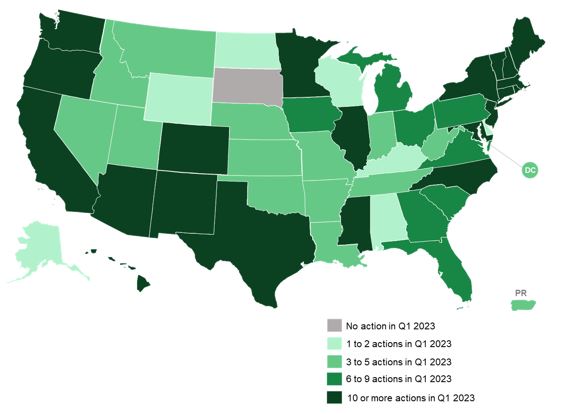The 50 States of Electric Vehicles: States Examine New Fees, Utility EVSE Ownership, and Telematics Use During Q1 2023
Raleigh, NC – (May 3, 2023) The N.C. Clean Energy Technology Center (NCCETC) released its Q1 2023 edition of The 50 States of Electric Vehicles. The quarterly series provides insights on state regulatory and legislative discussions and actions on electric vehicles and charging infrastructure.
The report finds that 49 states, plus the District of Columbia and Puerto Rico took actions related to electric vehicles and charging infrastructure during Q1 2023 (see figure below), with the greatest number of actions relating to rebate and grant programs; registration, mileage, or charging fees for electric vehicles; planning activities; and state procurement of electric vehicles. States also continued to take actions planning for National Electric Vehicle Infrastructure (NEVI) program funding distribution.
A total of 621 electric vehicle actions were taken during Q1 2023, with the most active states being California, Massachusetts, New York, New Jersey, Hawaii, and Texas. So far in 2023, state legislatures have considered at least 500 bills related to transportation electrification, with 14 states enacting legislation as of late April 2023.
Q1 2023 State and Utility Action on Electric Vehicles

The report discusses three trends in electric vehicle actions taken in Q1 2023: (1) states considering fees based on miles traveled or vehicle charging, (2) lawmakers addressing utility ownership of charging infrastructure, and (3) utilities increasingly using telematics to collect electric vehicle charging data.
“Many states are looking to separate the EV public charging market from the electric utility market,” said Rebekah de la Mora, Policy Analyst at NCCETC. “Bills preventing utilities from owning public charging stations were filed in various states, usually on the grounds of market protection. Regulators in some states have also shown concern regarding utility ownership of public EVSE.”
The report notes five of the top policy developments of the quarter:
- Georgia and Utah lawmakers advancing electric vehicle charging taxes;
- El Paso Electric and Xcel Energy proposing new electric vehicle programs in Texas;
- New York regulators approving demand rate alternatives for commercial charging;
- AEP Ohio filing an electric transportation plan as part of its electric security plan; and
- The Colorado Energy Office releasing its 2023 electric vehicle plan.
“This quarter, additional states indicated an intention to adopt the California Air Resources Board’s Advanced Clean Cars II rules, which require increasing percentages of zero-emission sales in their states until reaching 100% in 2035,” noted Vincent Potter, Policy Analyst at NCCETC. “The Governors of Delaware, Maryland, and New Jersey each announced intentions to adopt the ACC II this year. The states conducted workshops and outreach, with additional stakeholder engagement planned going forward.”
View the 50 States of Electric Vehicles 2023 Q1 Executive Summary
View and Purchase the 50 States of Electric Vehicles 2023 Q1 update FULL Report
View other 50 States Reports – Solar, Grid Modernization and Electric Vehicles
ABOUT THE N.C. CLEAN ENERGY TECHNOLOGY CENTER
The N.C. Clean Energy Technology Center, as part of the College of Engineering at North Carolina State University, advances a sustainable energy economy by educating, demonstrating and providing support for clean energy technologies, practices and policies. It serves as a resource for innovative, sustainable energy technologies through technology demonstration, technical assistance, outreach and training. For more information about the Center, visit: http://www.nccleantech.
Media Contact: Shannon Helm, NCCETC, shannon_helm@ncsu.edu